1998.Dec
Bíblia #6 – Biblia goes to America
December, 1998
cover, graphic design, some images inside
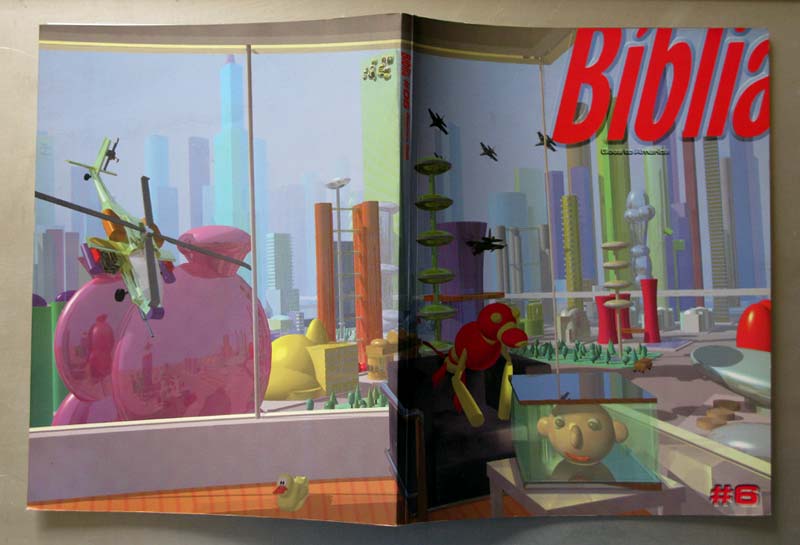
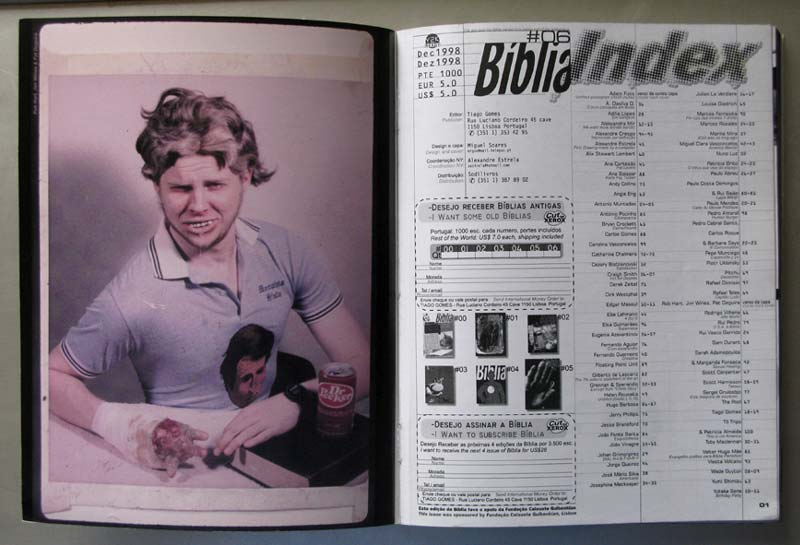
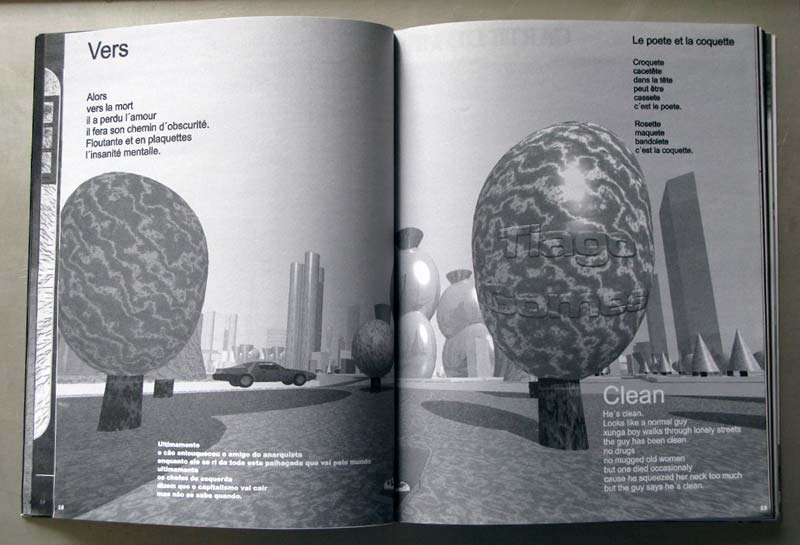
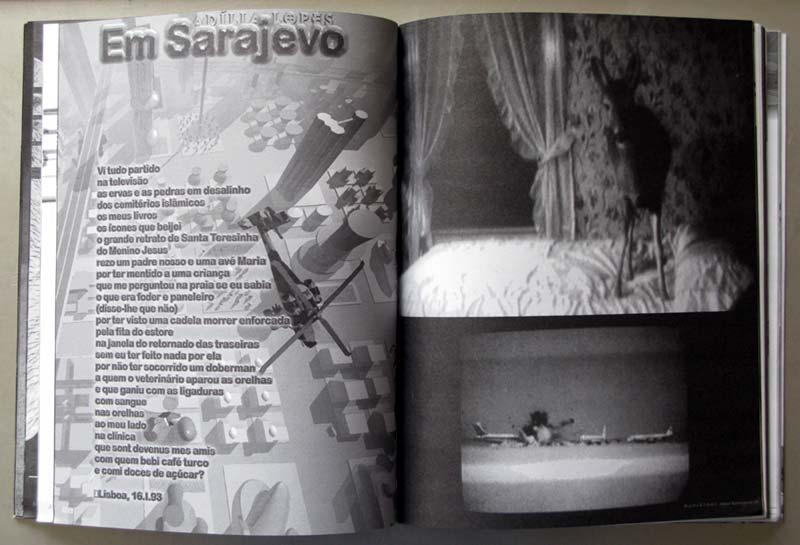
1998.Dec
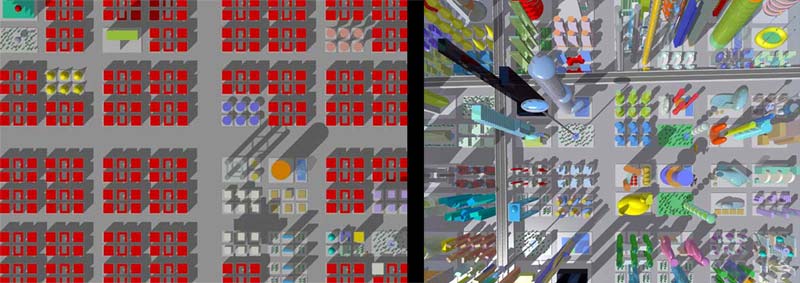
X city is a 3d virtual city that I was building and animating during a 3-year period.
It was meant to grow in size and complexity as I would get faster and faster computers.
I would transfer the city to a faster computer every time I could, so in the end it would be an
almost “real” city.
Unfortunately I started wrong by choosing the wrong software (Corel Dream 3d): animation had to
be done frame by frame manually, with no keyframes. Then files were put on a render queue.
X-city was based in the city of New York. In December 1998 I animated 3d planes crashing into
buildings. One can be seen on the cover of Biblia magazine #6 – Biblia goes to America.The other can
be seen as animation in this page and was part of my videofolio “miguel soares – works 1991-2001″.
During this period I always had the same computer (a pentium 166mmx).
I started at a rendering speed of 25 frames per day (1 second).
I abandoned the project when frames were taking 13 hours to render each.
I gave the computer to a friend.
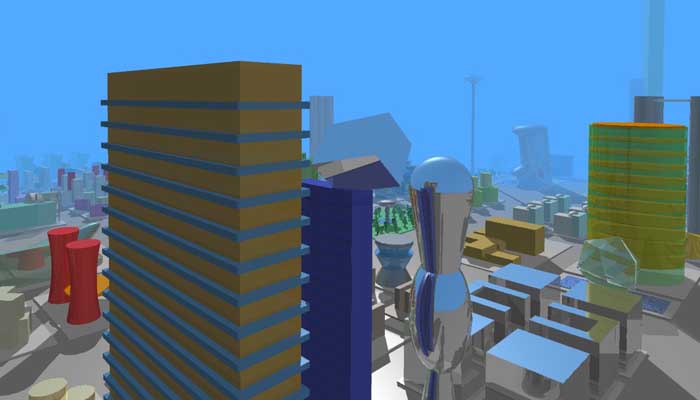
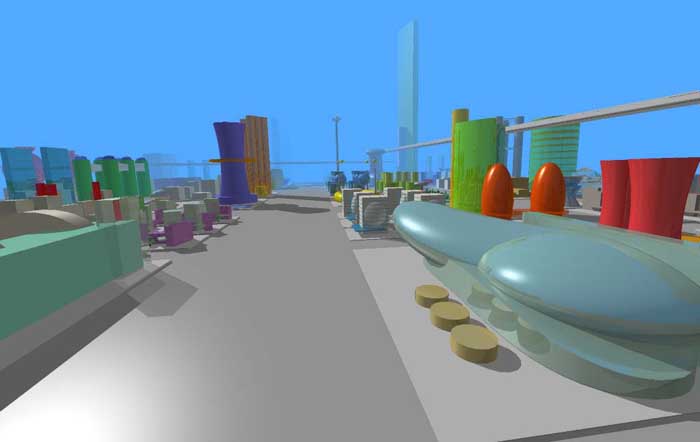

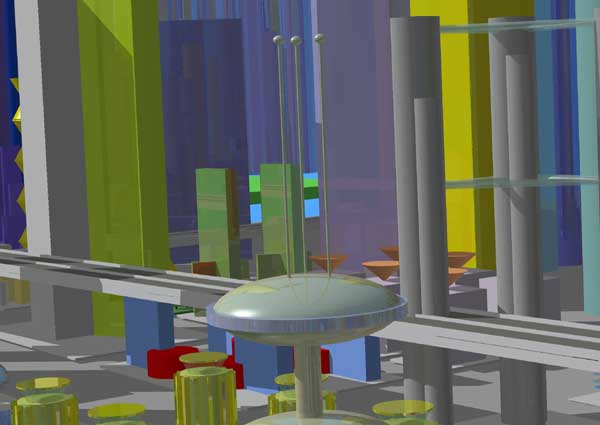
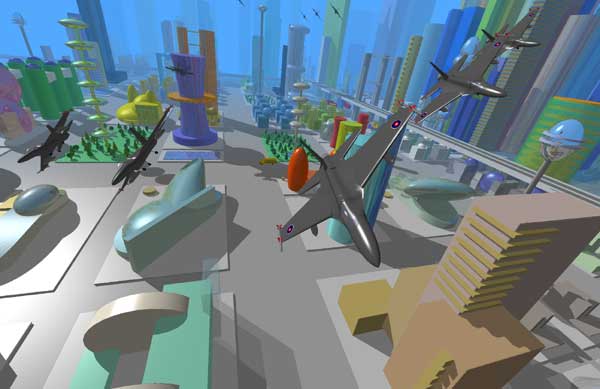
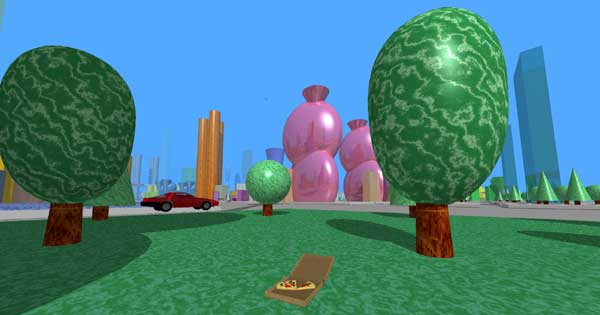
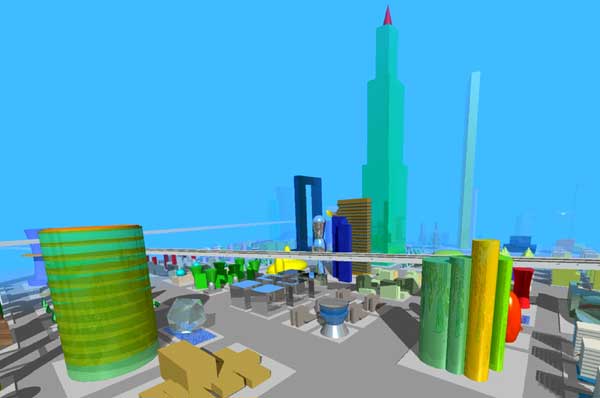
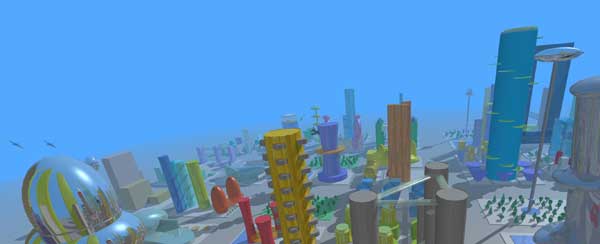
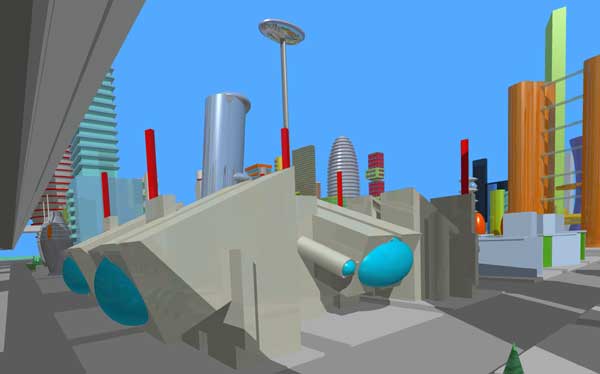
1998.Nov
O Império Contra Ataca
curated by Pedro Cabral Santo & Carlos Roque
November 25 > December, 1998
Capella de l’Antic Hospital de la Santa Creu
Barcelona, Spain
exhibited works: untitled (desktop)
1998.Sep
Atlas – Colección de Ilustraciones La Casa del Futuro
curated by MacDiego
Sevilha (Spain). Frankfurt (Germany). Milano (Italy). Lisbon – Standard Eléctrica (Portugal).
catalogue ISBN 84-605-81 38-1

1998.Aug
Biovoid
curated by Alexandre Estrela
August 07 > 31, 1998
Sala do Veado – Museu Nacional de História Natural
Lisbon , Portugal
exhibited work: Barney Online Slipgate Remix
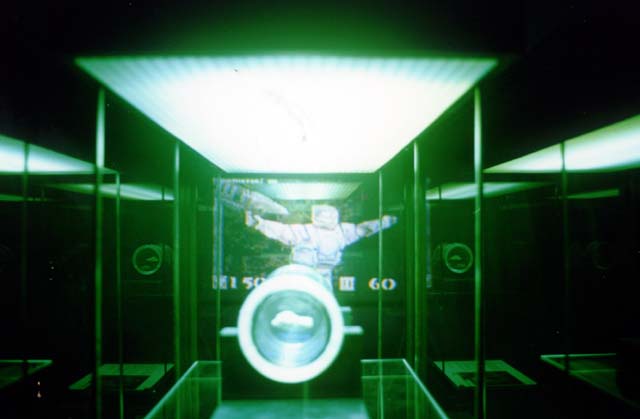
exhibition view: Juian La Verdiere (front), Miguel Soares (back)
1998.Jul
Book cover for Fernando Guerreiro’s Outono.
Black Son Editores, July 1998.
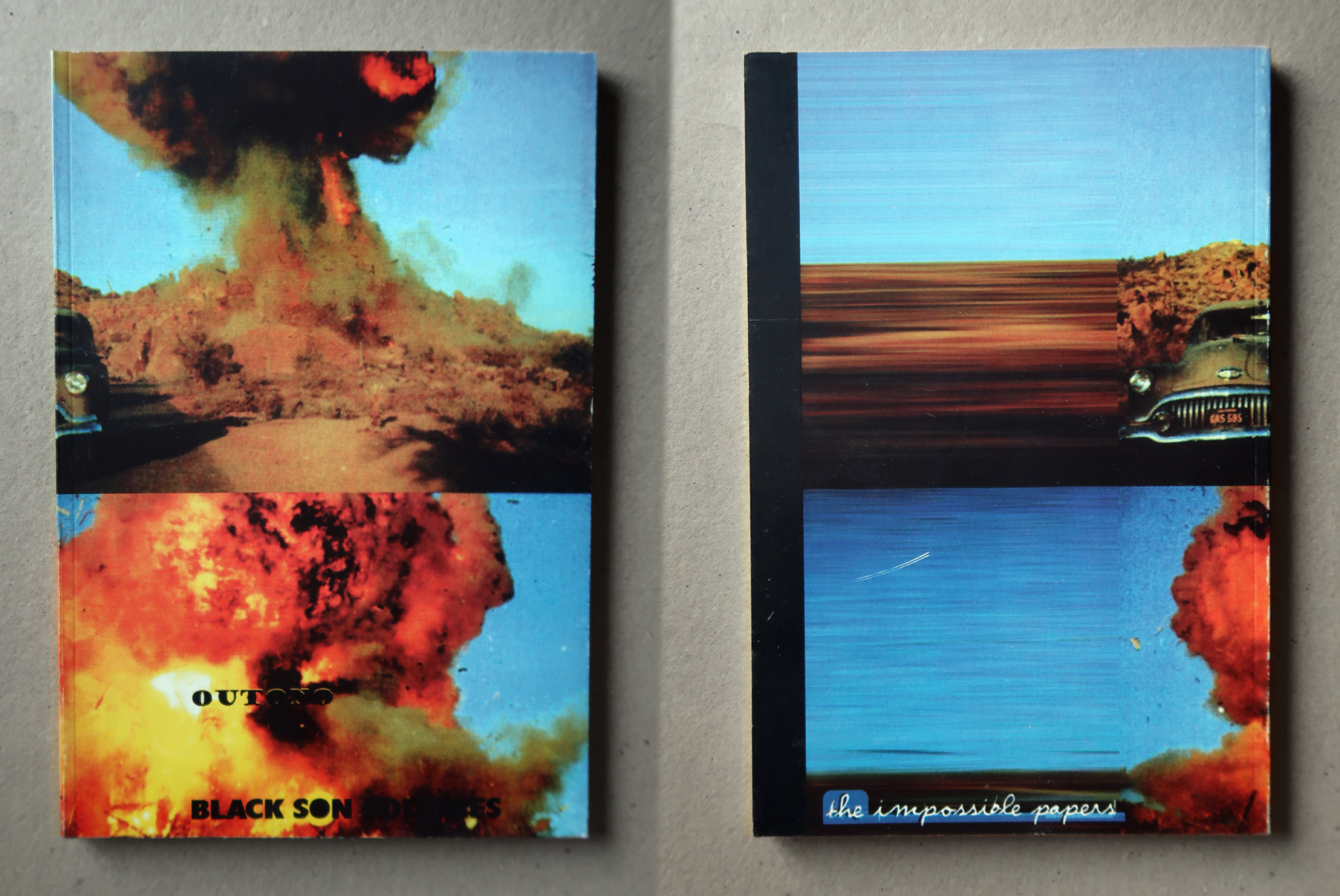
1998.Jul
Book cover for Rita Taborda Duarte’s Poética Breve.
Black Son Editores, July 1998.
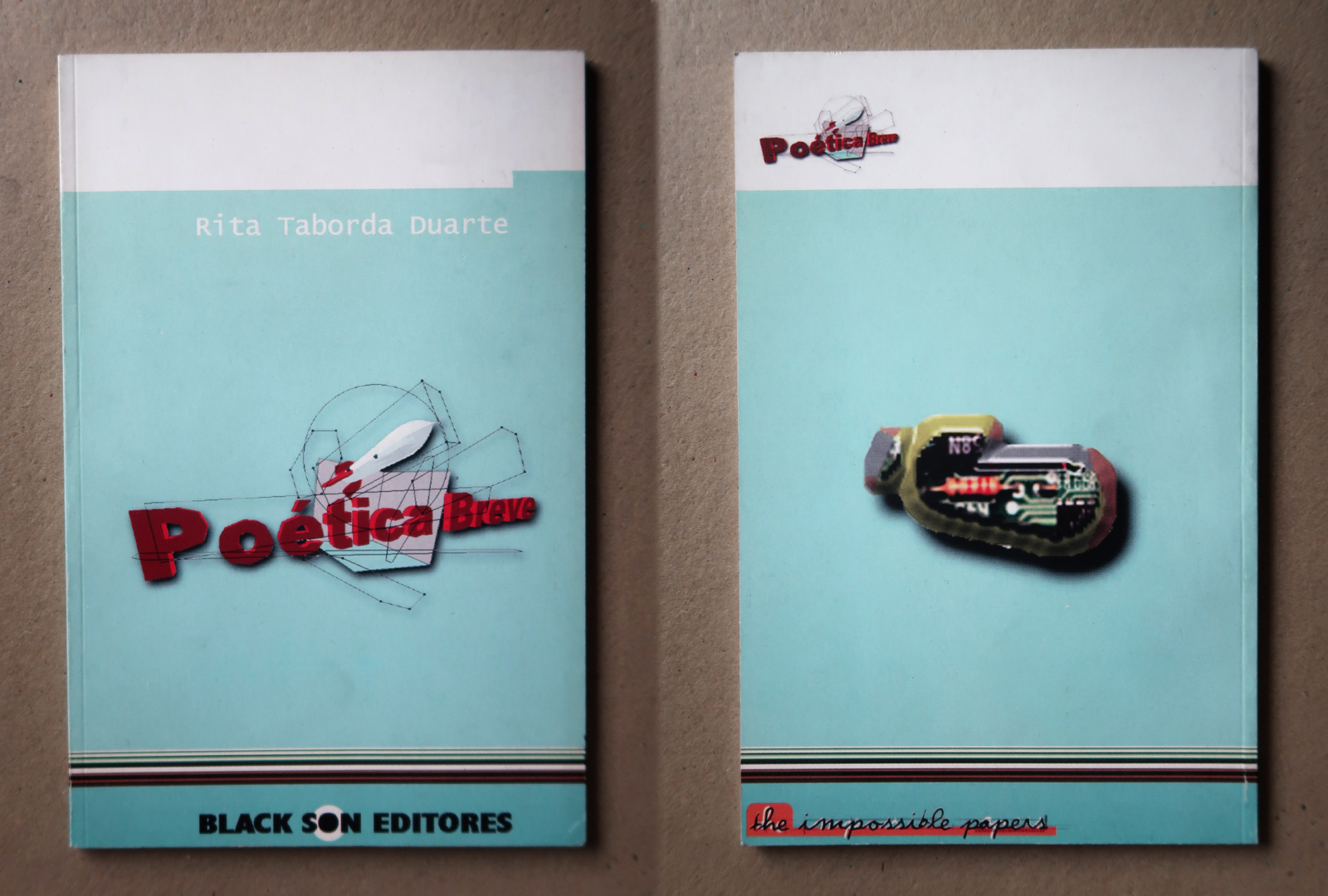
1998.Jun
Flash Back – 25 anos do AR.CO
June 04 > July 04, 1998
Galeria Municipal da Mitra
Lisbon, Portugal
exhibited works: Fuji, 2 Duratrans images on aluminium lightboxes.
1998.Jun
1998
40×40x15cm
duratrans on lightbox
For the Flashback exhibition, comemorating the 25th aniversary of the art school where I studied
photography in, I composed this image from 5 diferent layers:
Layer 1- Dog
Layer 2- Monorail
Layer 3- Hotel
Layer 4- Mount Fuji
Layer 5- a 3D plane
Few people can survive as contemporary artists in Portugal. Lots of artists work “like dogs” (we use
this expression) without any good results. Some of them have to escape (”fugir” in portuguese), emigrating.
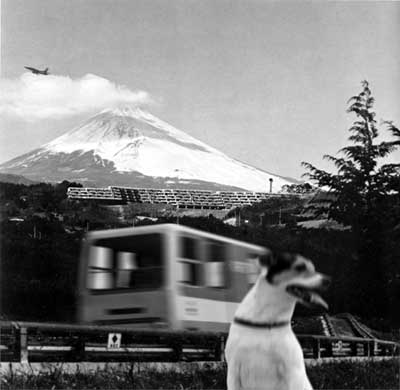
1998.May
O Império Contra Ataca
curated by Pedro Cabral Santo & Carlos Roque
May 23 > June 27, 1998
Galeria Zé dos Bois (ZDB)
Lisbon, Portugal
exhibited works: untitled (desktop)
1998.May
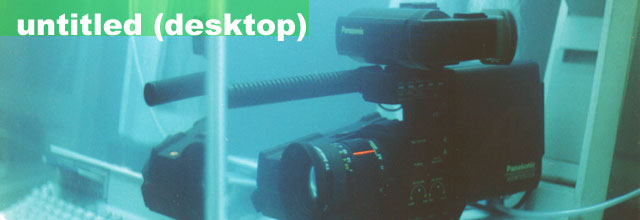
untitled (desktop), 1998, 65×50x50cm
aquarium, air pump, water, laptop computer, video camera, cell phone, remote control.
made for O Império Contra Ataca, Galeria ZDB, Lisbon and La Capela, Barcelona
Desktop was made for the O Império comtra ataca exhibition, Galeria ZDB, Lisbon
(curated by Pedro Cabral Santo and Carlos Roque).
The exhibition was a reaction / comment on the Expo’98 World Fair, opening in Lisbon the next month, under the theme The Oceans: A Patrimony for the Future. The biggest Oceanarium in Europe was being built. At the same, time a big exhibition was taking place in one of our 4 main art institutions: “The Eighties”, curated by Maria de Corral, at Culturgest, where one could see the famous vacuum cleaners inside plexyglas boxes by Jeff Koons.
Desktop is an aquarium with electronic equipment from the early 90’s. Inside the aquarium are:
An Hewlett Packard portable computer
A Panasonic video camera
A Nokia mobile phone
A remote control
and a 3.1/2 floppy disk.
This work shows concerns on the technology race and what to do with outdated equipment.
As if we should put the junk and polution inside a big oceanarium, leting the fish loose and healthy in the ocean, and not the inverse.
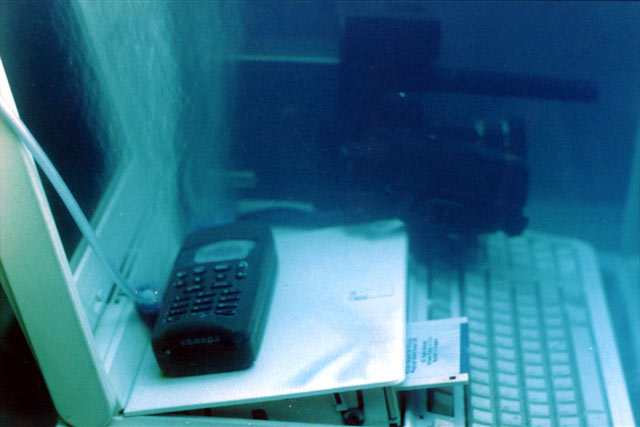
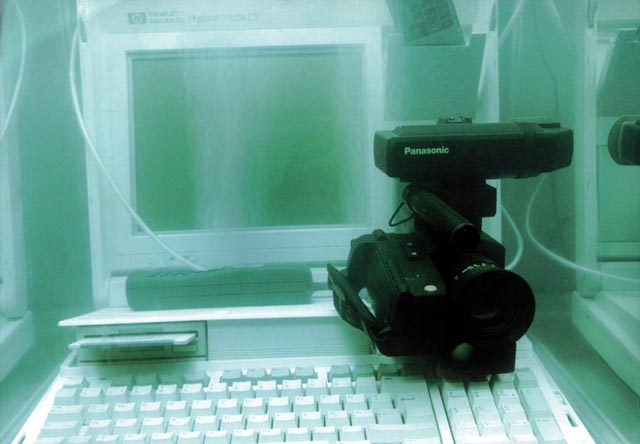
1998.Feb
Observatorio
curated by João Pinharanda
February 14, March 22, 1998
Sala de Exposiciones del Canal de Isabel II
Madrid, Spain
exhibited works:
1998.Feb
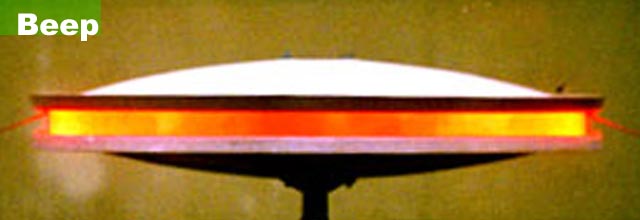
1998
90×90x26cm
satelite dishes, motion detector, walkman, tape, speakers, lamps, 4 channel sequencer, Manfrotto Autopole, steel cable.
made for Observatorio, Canal Isabel II, Madrid. February 1998
Beep is a flying saucer made out of two satelite dishes.
With its red lights it scans the area around, a 15 meter diameter ball of steel, a former water reservoir in Madrid.
The sound of static (a bit like vinil scrath), is interrupted every minute by an echoeing beep.
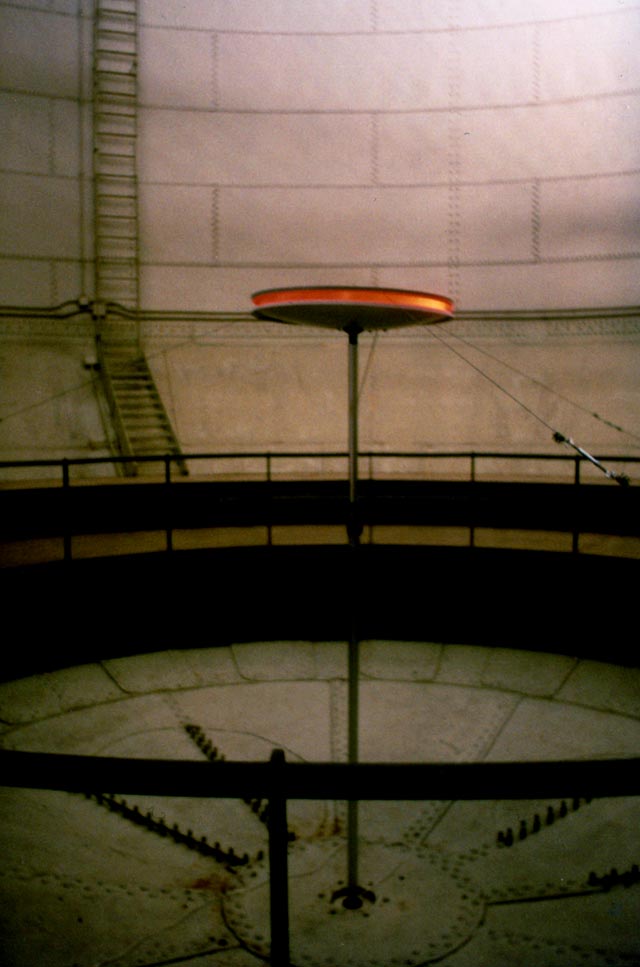
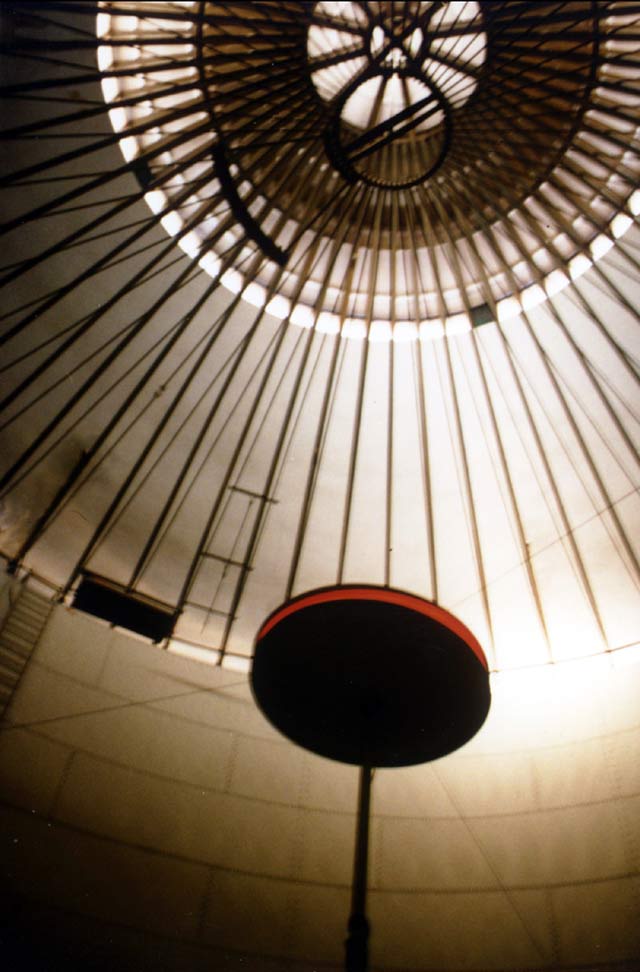
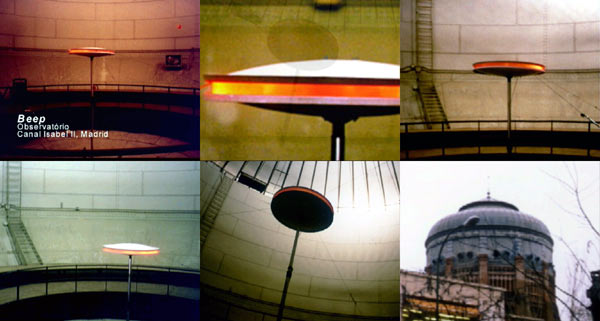
1998.Feb
Project Room at ARCO’98
February 12 > 17, 1998
Parque Ferial Juan Carlos I
Madrid, Spain
exhibited works:
variable dimentions
air extractors, satin, sneakers, 2 doors, motion detector , walkman, speakers, motorized projector (JBSystems Techno).
see also: Heaven’s Gate, 1997
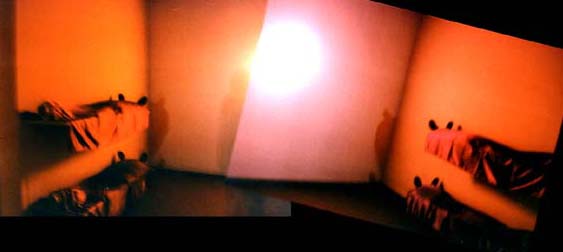
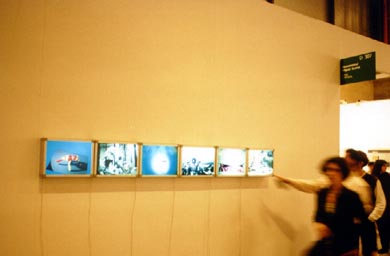
1998.Feb
1998
5 images, 30×40cm each
Duratrans on aluminium lightboxes
presented at the ARCO’98 Heaven’s Gate Project Room
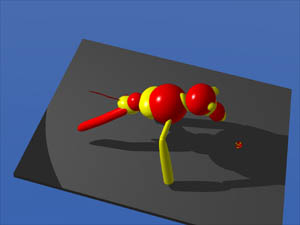
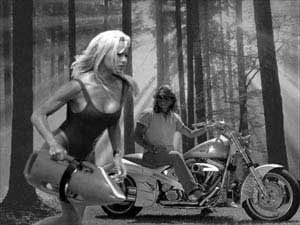
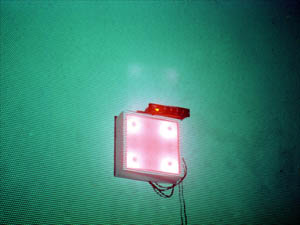
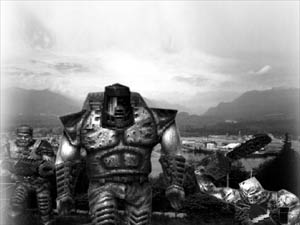
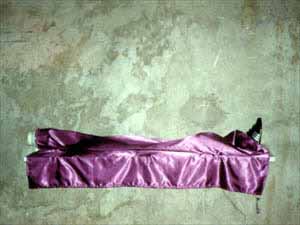
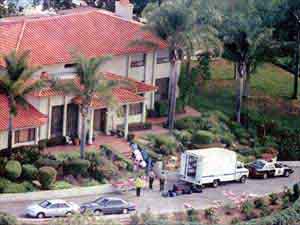
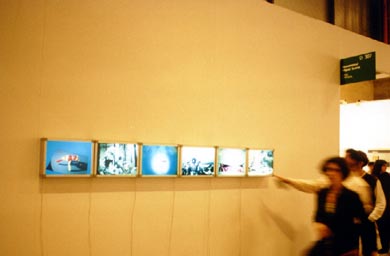
1998.Feb
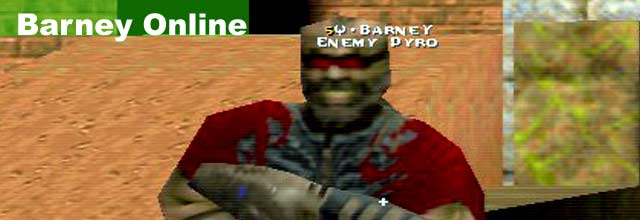
1996-1998
For two years I was a member and one of the leaders of a Quake TeamFortress internet Clan.
This work was presented in three forms:
-Barney Online (1997) video projection, stereo sound, 180′ presented at Observatório, Madrid, February 1998
-Barney Online – Slipgate Remix (1998) Video Projection, stereo sound, 6′45” presented at Biovoid, Sala do Veado, Museu Nacional de História Natural, Lisbon. August 1998
-As a work for the Antropology class: Quake TeamFortress: Aproximação a uma comunidade virtual, June 1998, 74 pgs. and VHS tapes, with Professor Dr. J.A. Fernandes Dias.
Barney Online is the record of a series of virtual performances of my character, 5Q.Barney, in the world of the internet game Quake TeamFortress.
After one year as Barney, I became first a member (by invitation), then 1st. advisor, and later, one of the 5 leaders of the largest and oldest active Quake clan in Portugal at the time: the 5Q Clan, that reached 32 members (5Q stands for 5 Quinas, as symbol of a good defense, present as well in the portuguese flag).
The global Quake community meets everyday in thousands of different locations (servers) where they chat, interact and kill each other.
Most of this comunity joins clans of 10 to 40 members. Admission into a clan is very difficult -requiring skill, morality and an understanding of each clan’s hierarchy and rules. Lastly, approval from the clan leader, founders or council is necessary. Matches between clans often include thorough preparation of attack and defense tactics. Skins (the character’s physical appearance) and maps are built by the community and sent to the servers, becoming available to everyone.
Quake TeamFortress is extremely violent, yet establishes friendships amongst its participants.
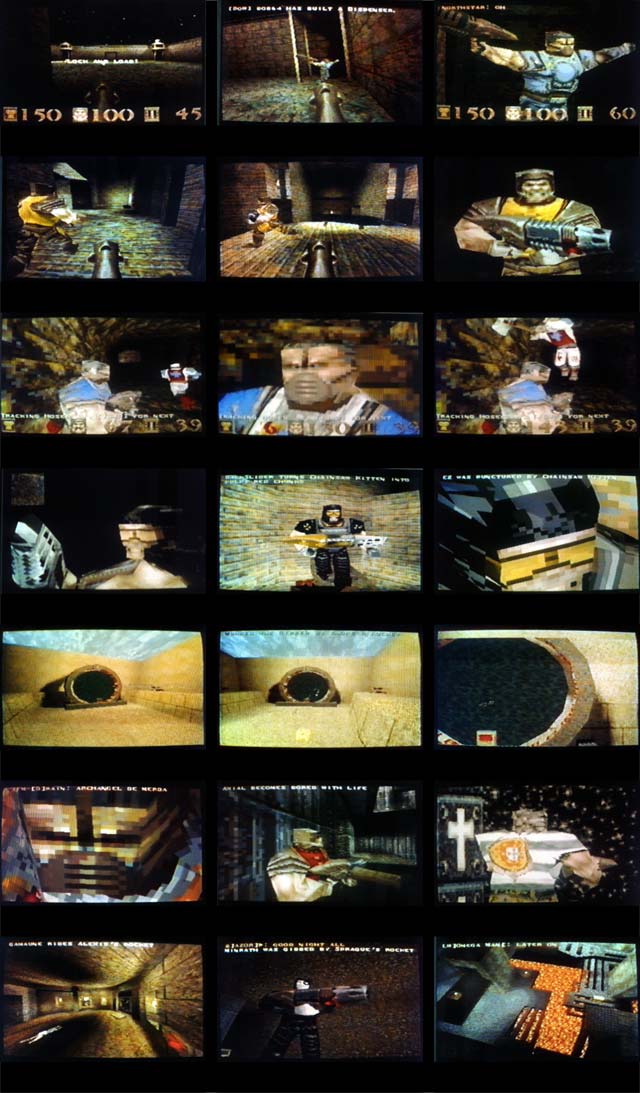
|



